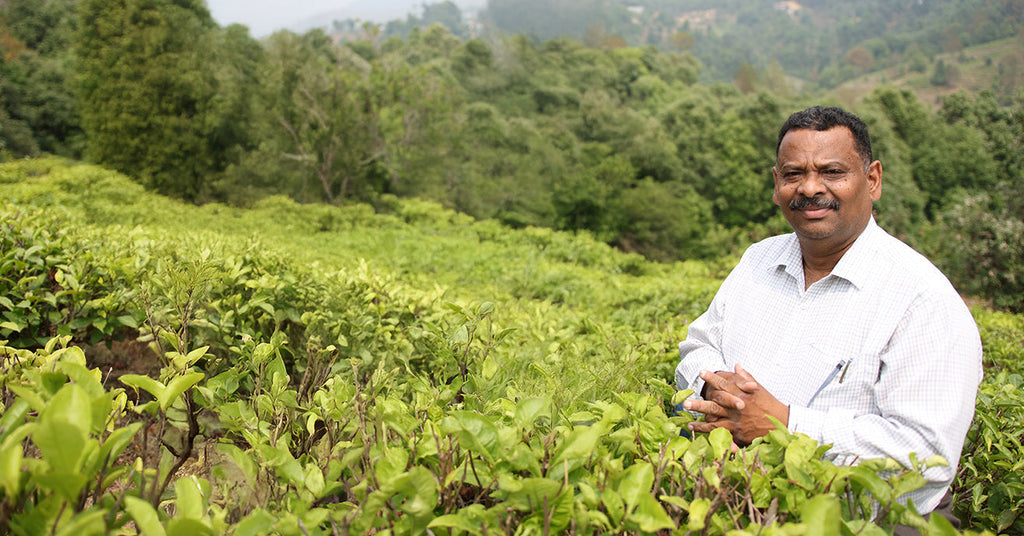The Making of A Tea Maker

"Desmond grew up in the heart of a Himalayan jungle, tracking leopards and chasing howler monkeys out of his family’s onion patch.” Sounds like the opening line to an adventure novel, right? But this story is non-fiction. And like any great adventure, it hinges on two moments where difficult choices shaped everything that followed.
Born off-grid and five kilometers from the nearest road, Desmond was raised on a stunning ridgeline in India’s Kumaon Himalayas. His family’s homestead sat perched on top of a tea estate called Chirapani (translates to “split water”), named for the waterfall at the top of the estate, whose waters flow through the entire garden. The story begins a couple of generations earlier, when Desmond’s grandfather, a rubber plant grower, bought a crumbling 100-acre tea estate in northern India. Left to wild boars and overgrown oaks, Chirapani had long fallen into ruin. Desmond’s father was tasked with bringing it back.
And so Desmond, an Anglo-Indian Christian living in a formerly British tea estate outside a Hindu mountain village, grew up somewhere between cultures, between eras, between worlds. His family had more land than their neighbors, but none of the luxuries. Electricity? Only when the inverter worked. Dinner? Usually harvested from the family’s farm and flavored by multiple continents: mutton stew, rotis, and fiery Punjabi-style pickled chillies, all in one sitting.

Despite all this (or maybe precisely because of it) Desmond turned out to be one of those rare combinations of deep thinker and hands-on doer. He left the mountains to study Biochemistry at Aligarh Muslim University, one of India’s most prestigious institutions. While there, he earned an MSc and, during a break between semesters, was offered an opportunity many rural Indians only dream of: entrance into a PhD program in Australia.
Cue pivotal decision #1.
Desmond brought the news home, where his father, now too old to manage the garden, sat him down and said: “Son, I’ve taken Chirapani as far as I can. Now, only you can take it forward.”
So Desmond brought his Big Decision to his advisor. And she gave him one of those thoughts that rearrange your life: “You can go abroad, do well for yourself, and that would be good for your family. Or, you can go home, take up the mantle, and do something for your entire community.”
Desmond went home and never looked back.

That could have been the whole story. A return to the land, a father-son baton passing, and a quiet life in the hills. But Desmond doesn’t really do “quiet.” After returning to Chirapani, he began working with the Uttarakhand government’s Tea Development Board, where his Biochemistry degree came in handy as he trained farmers on how to improve their tea quality. He traveled across the state, recruiting new growers, designing village-based training programs, and helping set up three regional factories. By the time I met him, he was a senior architect in the state’s tea efforts, which supports over 6,000 small farmers.
And then, another decision point.
In 2022, we had the chance to try something no one had done before in India: launch a specialty tea factory and share its ownership with local farmers. But it would require someone with Desmond’s deep tea expertise and thick skin to get through India’s legendary red tape. We couldn’t do it with half-measures or side gigs. I remember sitting with him over endless cups of tea, talking through the risks. His sons were both starting college. The government had just offered him a promotion. Walking away from a pensioned civil service job wasn’t just bold; it was financially bonkers.
To make it harder, you don’t just “quit” an Indian government job with a two-week notice. Desmond had to submit a formal resignation and then wait for the Board to accept it. For six months, they stalled. During that time, they offered him new postings, higher pay, and more influence. One of my favorite stories from that time: Desmond was offered to be the director for the entire state-wide program. He smiled politely, said, “You should’ve offered me that years ago”, then walked out.
What made him do it? Simple: farmers.

He believed in their power to not just grow tea, but to harness tea’s power and create intergenerational wealth. That belief became Kumaon Tea, and Desmond is its first CEO. Now, he's leading the country’s first farmer-owned specialty tea factory through its early harvests, navigating new challenges, and still drinking several cups a day (he starts every day with a strong cup of traditional chai.)
The truth is, Desmond’s story is still being written. But if there’s a thread that runs through it all, it’s this: given a choice between doing well for himself and doing good for others, he’s chosen the latter. Twice.
And all of us, farmers, tea drinkers, and this guy who gets to call him a partner, are better for it.

Blog Author:

Raj Vable, Founder
He has been confounded by the leaf since his first transcendental encounter with white tea in 2010. Three years later, he started Young Mountain Tea to bridge his budding tea obsession with his interest in traveling in the mountains and previous experience creating job opportunities in rural India. He revels in working across cultures and can be regularly found trying to get the rest of the team on board with another outlandish tea project. His favorite teas remain white, and he’s always searching for the next cup of magic.

Comments on this post (1)
What a lovely heat-warming story! What an amazing person! All the best in your new adventures, Desmond.
— Pushpa Murthy